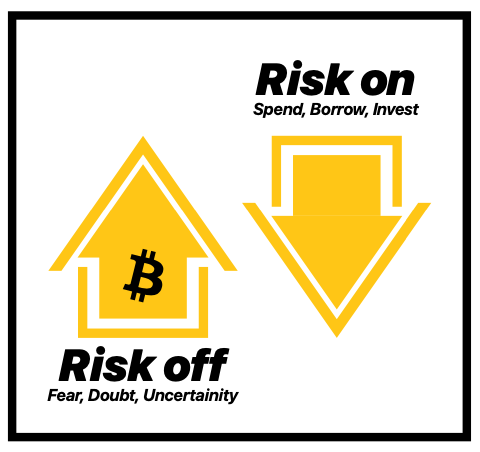Viewpoint | Talking about Bitcoin from the Theory of Monetary Information: Bitcoin is the ultimate safe-haven asset
Text: Dan Held
Source: Coin Research Institute
Editor's Note: The original title was "Money Information Theory"
The copyright of this article belongs to the original author, which only represents the author's own opinion, and does not represent the opinion or position of Cointrust or the Cointrust Research Institute.
- Weekly data report on the BTC chain: The data on the chain rebounded quickly after the rebound, and the sluggish situation is still difficult to get out of
- ChainLink, the oracle connecting the two worlds
- Beijing will promote blockchain technology applications in more than 20 areas including real estate transactions
This article is about 3000 words and it takes about 8 minutes to read the full text.
Price and market are intricate

01
Price reflection information
"In a free market economy, price is knowledge and a signal to convey information. Prices are not just a tool for capitalists to make a profit; they are information systems for economic production that can exchange knowledge and coordinate complexity globally Production process. "
——Saifedean Ammous
Price is the coordinating force of a free market system. Every individual decision maker can rely on the prices of goods and services to help them make decisions, because the price itself is a measure of all known market information. In other words, the compression of all relevant data ultimately manifests itself in price (for more technically savvy, this is a one-way hash function).
Everyone's buying and selling decisions in turn further determine the prices that will bring this changed information back to the market. Some of you may have heard this from the "efficient market hypothesis" about how market information is reflected in asset prices like stocks.
Money is a ruler
Currency is the central information tool of the world economy. As a medium of exchange, a store of value, and a unit of account, currency is an important tool for information about market conditions.
The capitalist economy is not an equilibrium system, but a dynamic field of entrepreneurial experiments. Money should be the yardstick for measuring the results of entrepreneurial experiments. "
——George Gilder
The essence of capitalism is to effectively allocate capital under the constraints of scarce resources and time. Companies are experimenting with how best to allocate capital, and money is the standard measure of efficiency. Making money represents an effective allocation of capital, and losing money is not an efficient use of capital. Competition means decentralized planning by many independent companies and people to solve problems in the market.

Capitalism, like nature, is about experimentation.
Information is decentralized
"A centrally planned economy can never be compared with the efficiency of the open market, because what a single subject knows is only a small part of the total amount of knowledge owned by all members of society . " — Hayek ).
Thus, a decentralized economy complements the fragmentation of information disseminated throughout society. Each company tries to take advantage of the local knowledge it has and create a good or service that ends up being the correct distribution of capital (that is, profit).
To emphasize the degree of fragmentation of this information, I will give an example of Milton Friedman, who declared, "No one in the world will make a pencil:
- Wood comes from a tree
- In order to cut down that tree, a saw is needed
- To make a saw, steel is needed. In order to make steel, iron ore is needed
- Graphite from South America
- Eraser is rubber, probably from the tropics
- And yellow paint
- And the glue that holds them together
There is no central planning office here. This is the magic of the price system.

Action. Research on human actions.
The central bank has unresolved data problems
Central banks inherently have data problems. As with any electronic signal processing system, there are bottlenecks in ingestion, processing, and decision making. The central government cannot plan the economy because the central government cannot have all the necessary knowledge to make the best decisions at any single point in time–not to mention all of them.
"This is a question of the use of knowledge, no one can get all the knowledge"-Hayek
In order to operate effectively, the central bank will have to ingest tens of trillions of data points every day and ingest them in an impossible and perfect way. Every time I sit uber, every time I buy a sandwich, every time I buy something in the app.
"We must believe that we live in a predictable and controllable world, so we turn to people with authority who promise to meet this demand." –Philip Tetlock
We created the central bank because we want the world to be reasonable and we want to feel that someone is in charge. Even if we can get perfect data, it is difficult to infer simple causality for this complex, chaotic system involving billions of decision makers. Although it seems easy to determine the relationship between weather and crops, how do we determine the causality of burrito demand? Economics is not the same as science. Too small or incomplete sample sizes make it difficult for us. We can't recreate the Internet bubble with a different central bank or a different aggregate.
This raises the question of how central banks measure impact and make decisions. One classic says, "If you can't measure it, you can't manage it." We can't even measure kilograms with great accuracy (https://www.smithsonianmag.com/science-nature/redefine- kilogram-180970798 /), so how can we measure inflation correctly? (Example: CPI excluding food and energy!)
" Because big events happen suddenly, predictions can do more harm than good, that is, in a world where unpredictable events control most outcomes (also known as the Black Swan Incident), give a predictable illusion "-Karl · Richards
He continued: "The risk is what is left when you think you have thought of everything. " Daniel Kahneman also attaches great importance to the dangers of history:
"Hindsight, the ability to explain the past, gives us an illusion that the world is understandable. It gives us an illusion that the world is reasonable, even if it is not reasonable. This is in many fields Have made a lot of mistakes. "
This is a useful analogy: In essence, the Fed is driving cars (that is, economically) with only foggy rearview mirrors and the front windshield is opaque (you can't see the future). How can the Fed drive cars accurately? What if we just let the car adjust automatically based on road conditions?
Without imagination and intuition, history cannot be explained. The absolute amount of evidence is so overwhelming that the choice of it becomes inevitable.
So what options do we have?
02
Sound currency
"A sound currency is equivalent to scientific integrity: after the experiment is completed, the system must not allow the data to be processed."
——Adam Taché
A sound currency keeps the ruler settings fixed, so the results cannot be changed through a central planning mechanism.
Bitcoin is the perfect iteration of a sound currency. Bitcoin has a hard cap for several reasons: to be a precise yardstick, to reduce the vector of political attacks, and to encourage speculative bubbles that will act as a viral loop.
But why is it 21 million? Why not 100 million?
The secret is … it doesn't matter! Its exact length is not important. It is important to have a fixed number. As economic activity bids farewell to the original scale, it is difficult for individuals to make decisions without a fixed accounting unit to compare values.
Regarding the political attack vector, Satoshi Nakamoto believes that it is impossible to set an "appropriate" inflation rate, so he decides to eliminate artificial decisions from the process. Satoshi Nakamoto supports this conclusion with two quotes about fixed supply:
"It's true that no one acts as a central bank or federal reserve to adjust the money supply as the number of users grows. That will require a trusted party to determine value, because I don't know how to let software know the real world value of things."
Satoshi Nakamoto also said:
"If there is some clever way, or if we want someone to actively manage the money supply to anchor it to something, then rules can be made for that."
Finally, Satoshi Nakamoto assumed that fixed supply could cause speculative bubbles.
"As the number of users grows, the value of each coin increases. It has the potential to generate a positive feedback loop; as users grow, the value rises, which may attract more users to take advantage of growing value."
Meaning of sound money
Bitcoin is the ultimate safe-haven asset. As more people buy Bitcoin and this narrative, it has become a de facto risk off asset.
After hyperbitcoiniation, when bitcoin becomes the medium of exchange, value storage and accounting unit, bitcoin will reflect the most accurate "risk-free" rate of return we have ever had, which makes economic and market participants most effective To allocate resources. Every market participant, whether an individual investor or a company, makes a decision to chase / avoid risk, and then reflects it in the price of Bitcoin.

Finally, when Bitcoin is the unit of account used by every business, market participants can view the flow of funds of their suppliers and customers in real time through their publicly disclosed Bitcoin addresses. This transparency makes the market extremely efficient through the best handling of information.
Bitcoin reconstructed how to allocate capital efficiently in our economy, and ultimately created a world with richer resources for all.
Dan Held
November 2019
We will continue to update Blocking; if you have any questions or suggestions, please contact us!
Was this article helpful?
93 out of 132 found this helpful
Related articles
- Featured | Top 10 content producers in the currency of Twitter; Is Bitcoin 2020 really like the early Internet?
- Can distributed search engines challenge Google's dominance?
- If Buffett wanted to buy Bitcoin, what would he buy?
- Opinion | Synthetic tools will become the ladder to the future of DeFi and achieve the popularity of DeFi
- 36 transactions cleared the HEX investment address, 48,000 ETH were scattered and transferred. It is suspected that the scam project is finally hammered?
- DeFi weekly selection 丨 DeFi lockup value is approaching US $ 1 billion. Will the "ruler" Maker be overthrown in 2020?
- Bitcoin's eternal battle: fighting entropy, rising on the borders of order and chaos





